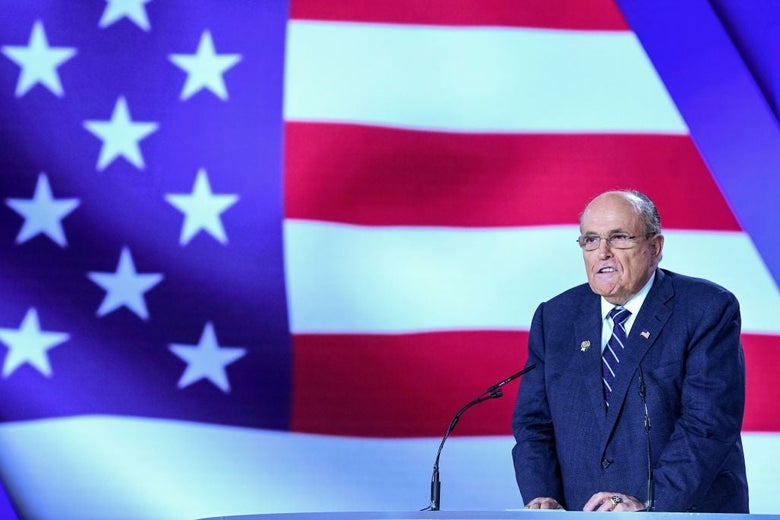
Rudy Giuliani at an event held on July 13 by the “People’s Mojahedin Organization of Iran,” an exile opposition group, in the Albanian town of Manza.
Gent Shkullaku/AFP/Getty Images
In May, at around the time that Rudy Giuliani was getting his Ukraine-Trump favor-trading scheme underway in earnest, the Senate Judiciary Committee held a hearing with attorney general William Barr that covered Robert Mueller’s recently released special counsel report on Russia and the 2016 election.
At the hearing, Republican Nebraska Sen. Ben Sasse observed that Donald Trump’s campaign chairman, Paul Manafort, had worked for individuals connected to the Russian regime shortly before joining the Trump operation. One Manafort client—oligarch Oleg Deripaska—believed Manafort owed him money, and when Manafort began working for Trump on a “volunteer” basis, he offered to discuss the campaign with Deripaska in what appears to have been an effort to settle their financial dispute. Manafort would eventually supply Deripaska with internal campaign polling data, which was delivered via an intermediary who has, as they say, “ties” to Russian intelligence. More broadly, Trump took Russia-friendly positions on several foreign policy issues during Manafort’s tenure.
Mueller did not charge Manafort with a crime for this activity, writing that his investigators were unable to interview Deripaska and Manafort’s intermediary or determine what the shared data was used for. Sasse’s point in bringing all this up was that Russia seemed to have gotten a significant return on its investment in Manafort without, apparently, having technically violated any American laws.
What, he asked, would stop other foreign entities from putting well-connected Americans on their payrolls in the hopes that they, like Manafort, would coincidentally find “volunteer” roles from which they could advance those foreigners’ interests?
The answer, Rudy Giuliani has demonstrated, is nothing!
Here are some of the stories Giuliani, who is one of Donald Trump’s personal lawyers, is currently in the news for.
• Trying to persuade Secretary of State Rex Tillerson to help get U.S. criminal charges dropped against a Turkish businessman named Reza Zarrab who is a legal client of Giuliani’s and who has been accused of violating sanctions against Iran.
• Trying to persuade Trump to arrest and extradite Turkish opposition figure Fethullah Gulen, who lives in Pennsylvania. (Giuliani has denied being paid by the Turkish regime, but told the Washington Post he could not discuss the matter further because of “attorney client privilege.” The Turkish government has also sought Zarrab’s release.)
• Successfully trying to persuade Trump to fire U.S. ambassador to Ukraine Marie Yovanovitch, whose dismissal was also sought by a Ukrainian client of Giuliani’s (Lev Parnas) who was recently arrested and charged with making illegal campaign donations.
• Launching the entire Ukraine scandal by meeting with the country’s former prosecutor general, Yuri Lutsenko, in January to discuss bogus accusations against Joe Biden—a meeting that was reportedly arranged by Parnas . (Parnas and another Ukrainian named Igor Fruman seem to have wanted to connect Giuliani and Lutsenko as part of a scheme to raise their profile with top government figures in Ukraine.)
In these cases, Giuliani has used his access to the top figures in the Trump administration—which, remember, he has because he’s Trump’s personal lawyer—to lobby for foreign clients whose interests are, at best, not aligned with the United States’. (Giuliani denies that he is a “lobbyist” in the legal sense, but in plain English there is no better way to describe what he does.)
The kicker: Giuliani, like Manafort did, purports to work for Trump on a pro bono basis. So the cycle works like this: Giuliani gets paid by a foreign entity in some corruption-intensive part of the world. The foreign entity gets its case made directly to Trump or someone in his Cabinet. And Trump gets personal legal services from Giuliani without having to pay for them. It’s a win-win for everyone—at least, for everyone who matters.
Readers like you make our work possible. Help us continue to provide the reporting, commentary and criticism you won’t find anywhere else.
Join Slate Plusfrom Slate Magazine https://ift.tt/2JuB01o
via IFTTT
沒有留言:
張貼留言